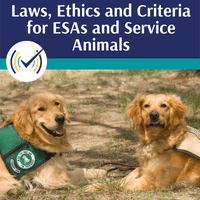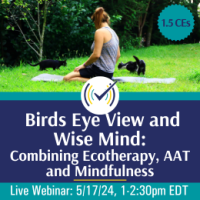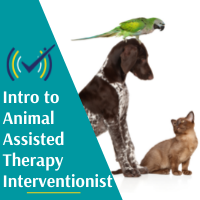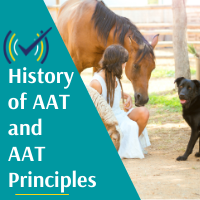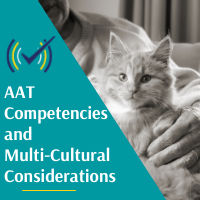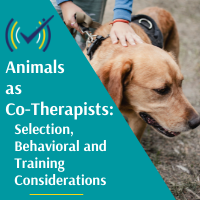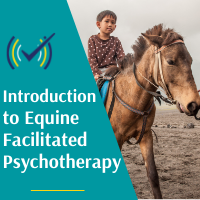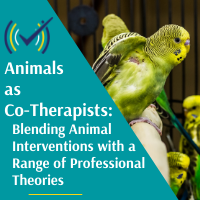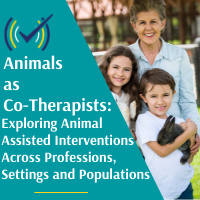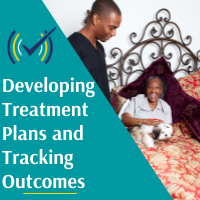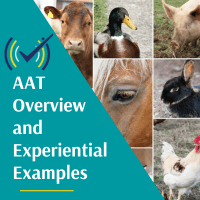The Animal-Assisted Therapy-Interventionist (AAT-I) Credential Program is a series of 8 online courses (listed below). The AAT-I online courses are designed for licensed/certified professionals to learn how to utilize Animal-Assisted Interventions ethically and intentionally per the American Counseling Association’s AAT-C Competency Requirements. This program is developed by an instructor with a Doctorate in Counselor Education and Supervision, as well as a practicing Animal-Assisted Therapist with almost two decades of experience. The program content has been reviewed by an advisory board of relevant professionals (e.g. LPC’s, LCSW’s) to ensure quality and relevance to a breadth of professionals seeking AAT certification and/or CEU’s. Your instructor believes in the evidence-based healing power of the human-animal bond. According to the American Veterinary Medical Association (AVMA, 2018), “The human-animal bond is a mutually beneficial and dynamic relationship between people and animals that is influenced by behaviors that are essential to the health and well-being of both. This includes, but is not limited to, emotional, psychological, and physical interactions of people, animals, and the environment.” This program teaches you how to be co-therapists in a triadic relationship with animals in a variety of settings to accelerate growth and transformation via the mind, body, spirit connection.
The AAT-I program consists of eight online, self-paced courses that are a mix of didactic presentations, videos, articles, textbooks and written assignments. The courses are:
- The History of AAT and AAT Principles
- AAT Competencies and Multicultural Considerations
- Animals as Co-Therapists: Selection, Behavioral, and Training Considerations
- Introduction to Equine Facilitated Psychotherapy
- Animals as Co-Therapists: Blending Animal Interventions with a Range of Professional Theories
- Animals as Co-Therapists: Exploring Animal Assisted Interventions Across Professions, Settings, and Populations
- Developing Treatment Plans and Tracking Outcomes
- Animal Assisted Therapy Overview and Experiential Examples
Upon completion of all 8 online courses, individuals will earn the AAT-I and can begin using the credential AAT-I.
This is a non-interactive, self-study program and consists of over 25.5 hours (1530+ minutes) of video instruction, reading assignments, written assignments, post-tests, and evaluations.
Textbooks are required to complete AAT-I learning content. Reading material is not included with course enrollment and must be purchased separately from retail booksellers. (See "Requirements" tab for specifics.)
Learning objectives for all 8 online courses include:
The History of AAT and AAT Principles
- Define the Human-Animal Bond, its importance in AATC and its effect in human interaction
- Explain the rationale for Animal Assisted Interventions (AAI), Animal Assisted Activities (AAA) and Animal Assisted Therapy (AAT)
- Describe the theoretical framework/Biophilia hypothesis for Animal Assisted Therapy
AAT Competencies and Multicultural Considerations
- Explain the ACA and Pet Partners Core Competencies for AAT-C
- Describe various ethics, laws, risks, and multi-cultural considerations that must be factored into the practice of AAT
- List the key elements of triadic relationships and being your animal’s best advocate in an AAT setting
Animals as Co-Therapists: Selection, Behavioral, and Training Considerations
- Explain how to understand and know an animal’s temperament, how different animals signal their needs and/or stress levels, and how you can to facilitate the animal’s socialization, desensitization, and comfort in preparing them for work in ATT
- Identify how to objectively assess an animals’ suitability, strengths and limitations for the therapy setting and how to select the appropriate training for you and your animal for AAT
- Identify key elements of animal care and advocacy, and the topic of Zoonosis and its implication in AAT
Introduction to Equine Facilitated Psychotherapy
- Describe the evolution of EFP and the difference between EFP, Therapeutic Riding, and Hippotherapy
- Define the roles of the mental health professional and the equine specialist in EFP, and differentiate models of interaction between the horse, client, mental health professional, and the equine specialist in EFP
- List important elements within EFP of horse behavior, reasons horses may or may not be suitable, and specific benefits to populations shown to benefit from EFP.
Animals as Co-Therapists: Blending Animal Interventions with a Range of Professional Theories
- Explain attachment theory, how an animal as a co-therapist can provide a corrective attachment experience for your clients, and the different means by which the human-animal interaction can elicit unexpected vulnerability and disclosures in others
- Match AAI’s with a variety of evidence-based counseling theories, explain how you would incorporate AAI’s with your theoretical orientation to support the population with which you choose to work
- Describe how to assess the suitability, amenability, and related safety concerns of each client to animal-assisted interventions in counseling
Animals as Co-Therapists: Exploring Animal-Assisted Interventions Across Professions, Settings, and Populations
- Explain key elements that factor into the effective matching of AAIs with clients’ needs/goals and how AAT can increase empathy in clients
- Identify how AAT can be utilized in a variety of settings that include: group, crisis, trauma, ADHD, autism, speech and physical/occupational therapy, anxiety, grief/loss, substance use, aging, medical and correctional settings, including examples of specific animal-assisted interventions
- List specific health considerations that must be factored into client interaction with animals in a medical setting
- Explain the “inner Zoo” and how to have animals as co-therapists in Group Settings.
Developing Treatment Plans and Tracking Outcomes
- Explain how to write a treatment plan with goals and objectives utilizing AAT
- Describe various AAIs that relate to building empathy, developing emotional regulation skills and client self-esteem, creating a corrective attachment experience, and working with anxious or depressed clients or those who have ADHD
- Explain the importance of using outcome measures in AAT
- Identify the different types of outcome measures that can be used to measure the effectiveness of AAT interventions
Animal-Assisted Therapy Overview and Experiential Examples
- Explain the Biophilia Hypothesis and its connection to the Human-Animal Bond
- Describe the Psychosocial, Emotional, Physiological Benefits of AAT
- Identify the dangers and risks associated with practicing AAT
- Describe the competencies necessary to ethically and effectively practice AAT
Each course provides an individual syllabus listing its specific requirements.
- Video Instruction
- Reading Assignments
Textbooks are required to complete AAT-I learning content. This reading material is NOT included with course enrollment and must be purchased separately from retail booksellers, such as www.amazon.com (search title and/or author of the book).
- Fine, A.H. (2019). Animal Assisted Therapy: Theoretical Foundations and Guidelines for Practice-Fourth Edition. London, UK.
- Levinson, B.M. and Mallon, G.P. (1997). Pet-Oriented Child Psychotherapy. Charles C Thomas Publishing, Springfield, IL.
- Parish-Plass, N. (2013). Animal-Assisted Psychotherapy Theory, Issues and Practice. Purdue University.
- Kohanov (2003). Riding Between the Worlds: Expanding Our Potential Through The Way of the Horse
Some courses include additional reading material, which is provided with course content.
- Written Assignments demonstrate understanding of the material. This includes responses to prompts given in an online forum and submitting reflections and research papers that vary in length in length from one paragraph to up to 4 pages. Reflections and papers require grading by the instructor.
- Post-Tests are given in each course to demonstrate understanding of the material. An 80% is required to pass and you can retake it if necessary.
- Evaluations are required once all previous steps have been completed. (Psychologists seeking APA hours are requested, not required, to complete the evaluation.)
From the time of registration, you have twelve months to access AAT coursework.
Dr. Christina Strayer, Ed.D, LCMHCS, AAT-I, THTC, CYT-200, NLC-P
Dr. Christina Strayer is a Licensed Clinical Mental Health Counselor and Supervisor, Licensed Clinical Addictions Specialist-Associate, Pet Partner Team Evaluator, Animal Assisted Therapist-Interventionist and Life Coach with her coaching practice Energy Coaching with Horses and Others (E.C.H.O.) in North Carolina. Her private practice is Animal Assisted Therapy of the Triangle. She is trained in a variety of Integrative Therapies including Art, Yoga and Mindfulness. Her theoretical approach is Client-centered and Holistic. Along with her mini goats, avian, equine, canine and crustacean helpers, Christina combines her study of the power of the Human and Animal Bond in healing with proven counseling theories and techniques to guide clients in reaching their goals.
She has a diverse background in counseling and teaching. She is the Lead Instructor for the Animal Assisted Therapy Interventionist (AAT-I) certification course. She has served as an adjunct professor at Campbell University in the Counselor Education department. She has traveled and conducted AAT seminars for PESI, a national continuing education organization and conducts Seminars/Workshops/Groups locally on a variety of Mental Health/Wellness topics. She primarily works in the areas of PTSD, Panic Disorder, Crisis Intervention, Compassion Fatigue, Stress, Trauma, Grief and Loss, Anxiety, Addictions, Depression, Goal setting, Consultation, Self-Esteem, Conflict resolution, Social Skills, Team Building and Life Balance/Transitions.
Christina graduated from the Doctoral program in Counselor Education and Supervision through Argosy University in Sarasota, FL. She obtained both a Master of Science in Counseling and Human Development with a concentration in K-12 School Counseling and a Bachelor of Science Degree in Psychology from Radford University in Radford, Virginia. She completed her Doctoral dissertation in AAT with Dooli, a rescue English Bulldog/Boxer mix, who was a dear family member and a beloved therapy dog to many over the years.
Credit Hours: This course consists of a total of 25.5 continuing education hours of credit when completing all eight courses. A separate certificate of completion is issued with each course included in this program.
Counselors: Telehealth Certification Institute, LLC has been approved by NBCC as an Approved Continuing Education Provider, ACEP No, 6693. Programs that do not qualify for NBCC credit are clearly identified. Telehealth Certification Institute, LLC is solely responsible for all aspects of the programs.
Telehealth Certification Institute, LLC is recognized by the New York State Education Department's State Board for Mental Health Practitioners as an approved provider of continuing education for Licensed Mental Health Counselors. #MHC-0048.
Marriage and Family Therapists: Many MFT licensing boards accept our courses or one of the approvals which we have from professional associations. You can check with your board to determine if your licensing board would accept this course.
Social Workers: Telehealth Certification Institute LLC, #1609, is approved to offer social work continuing education by the Association of Social Work Boards (ASWB) Approved Continuing Education (ACE) program. Organizations, not individual courses, are approved as ACE providers. State and provincial regulatory boards have the final authority to determine whether an individual course may be accepted for continuing education credit. Telehealth Certification Institute LLC maintains responsibility for this course. ACE provider approval period: 05/02/2021 – 05/02/2024. Social workers completing this course receive 25.5 clinical continuing education credits.
Telehealth Certification Institute, LLC is recognized by the New York State Education Department's State Board for Social Work as an approved provider of continuing education for Licensed Social Workers #SW-0435.
Addiction Professionals: This course has been approved by Telehealth Certification Institute LLC, as a NAADAC Approved Education Provider, for educational credits. NAADAC Provider #193104, Telehealth Certification Institute LLC is responsible for all aspects of the programing.
Psychologists: Telehealth Certification Institute LLC is approved by the American Psychological Association to sponsor continuing education for psychologists. Telehealth Certification Institute LLC maintains responsibility for this program and its content.
Telehealth Certification Institute, LLC is recognized by the New York State Education Department’s State Board for Psychology as an approved provider of continuing education for Licensed Psychologists #PSY-0128.
Art Therapists: Telehealth Certification Institute, LLC is recognized by the New York State Education Department's State Board for Mental Health Practitioners as an approved provider of continuing education for Licensed Creative Arts Therapists #CAT-0093.
Other Professionals: This course qualifies for 1530 minutes of instructional content as required by many national, state and local licensing boards and professional organizations. Retain your certificate of completion and contact your board or organization for specific filing requirements.
These are non-interactive, self-study courses.
To receive your certificate of completion you must complete the course in its entirety.
To complete an Online Self Study Course, one must register, log in, select the My Courses option from the menu items, click the Course Title, complete all of the requirements, complete and pass the post-test(s), and complete the course evaluation.
Psychologists and other professionals seeking CE credit through our approval with the American Psychological Association are asked, but not required, to complete the course evaluation before obtaining their certificate of completion, however passing a post-test for online self-study courses, and submitting one's attendance for live on-site and live webinars is required.
You can download or print your certificate of completion by logging into your account, navigating to the course by selecting the My Courses option from the menu items, clicking the Course Title, scrolling to the Certificate of Completion section, and clicking on the Certificate of Completion link to either download it or print it.
Participants may request a printed version of their certificate of completion to be delivered by mail. A shipping/handling fee of $6.95 will be charged per request. Shipping internationally may require an additional charge.
Directions for completing a course can be found by clicking here.
Hold an approved license or certification. Click here to view the full list of approved clinician types.
In order to earn the Animal Assisted Therapy Interventionist (AAT-I) Credential, you are required to complete the full program. Details and enrollment options can be found here.
The AAT-I program consists of eight online, self-paced courses that are a mix of didactic presentations, videos, articles, textbooks and written assignments. The courses are:
- The History of AAT and AAT Principles
- AAT Competencies and Multicultural Considerations
- Animals as Co-Therapists: Selection, Behavioral, and Training Considerations
- Introduction to Equine Facilitated Psychotherapy
- Animals as Co-Therapists: Blending Animal Interventions with a Range of Professional Theories
- Animals as Co-Therapists: Exploring Animal-Assisted Interventions Across Professions, Settings, and Populations
- Developing Treatment Plans and Tracking Outcomes
- Animal-Assisted Therapy Overview and Experiential Examples
Upon completion of all 8 online courses, individuals will earn the AAT-I and can begin using the credential AAT-I.
An optional opportunity to expand your training and attend a 2-day live intensive (in North Carolina) with experiential exercises is also available. Please This email address is being protected from spambots. You need JavaScript enabled to view it. for details on this event.
This is a non-interactive self-study program. Teaching methods for each course include recorded lectures, videos, text readings, written assignments, online discussion forums, and post-tests.
This course was updated September 20, 2023


